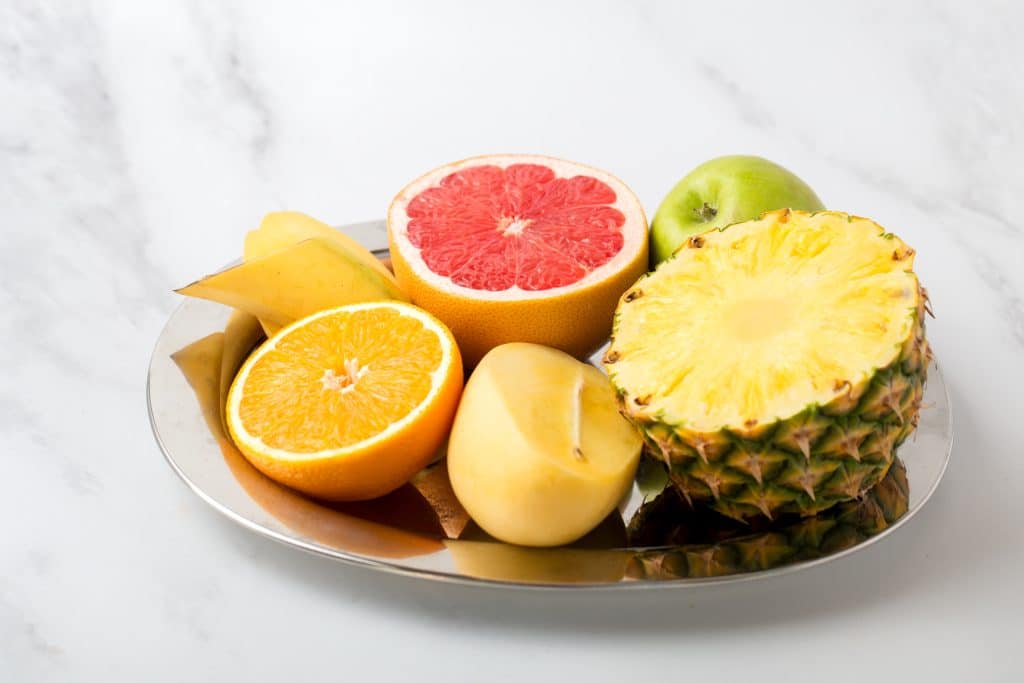Vitamin C is now one of the most common and well-known nutrients, found in everything from cough drops to skin serums. However, its importance to human health wasn’t always clear. The theory that humans need vitamins in addition to just protein, carbs, and fat was first introduced at the beginning of the 20th century. Vitamin C was only the second vitamin to be isolated and have its chemical structure defined. There is a wealth of knowledge today regarding how vitamin C benefits your body, what the best sources of this nutrient are, and so forth. This article will cover everything you need to know about this vital vitamin.
Contents
- What Is Vitamin C And What Does It Do For The Body?
- The Benefits Of Vitamin C
- Enhanced Brain Function
- Strengthens the Immune System
- Protects Vision And Eye Health
- Foods That Are High In Vitamin C
- Citrus Fruits
- Bell Peppers
- Strawberries
- How Much Vitamin C A Person Needs Per Day
- The Side Effects Of Too Much Vitamin C
- Start Reaping The Benefits Of Vitamin C Today!
- Related
What Is Vitamin C And What Does It Do For The Body?

Vitamin C, or L-ascorbic acid, is a water-soluble vitamin that your body cannot produce. Instead, you have to get vitamin C from the food you eat. Vitamin C is a vital antioxidant that helps preserve cells from harm caused by common illnesses, aging, and exposure to environmental stressors like UV light and pollution. Furthermore, the human body needs vitamin C to produce collagen.
This protein is responsible for aiding in wound healing, among other functions. Despite vitamin C’s important role in the body, there is still a lot that scientists don’t fully understand about how it works. Like other vitamins, vitamin C has many potential health benefits, but its impact on human health hasn’t been studied as thoroughly as other vitamins.
The Benefits Of Vitamin C
There are many potential benefits of vitamin C; here are a few of the most common ones:
Enhanced Brain Function

Vitamin C is an essential nutrient that plays a role in many different functions in the body. One of the most important benefits of vitamin C is its ability to support cognition and brain function. Vitamin C produces neurotransmitters, which are essential for communication between cells. It also helps to protect brain cells from damage caused by free radicals. Research has shown that vitamin C deficiency can lead to impaired cognitive function, while supplementation can improve memory and attention span.
Strengthens the Immune System

Vitamin C is a water-soluble vitamin that is found in many fruits and vegetables, as well as in supplements. Vitamin C is essential for the immune system, helping to protect the body against infection. Studies have shown that vitamin C can help to reduce the severity of colds and improve recovery time. Vitamin C is also an antioxidant, meaning it helps to protect cells from damage.
Protects Vision And Eye Health

Vitamin C is an important nutrient for the body and plays a role in many different functions. One of the most important benefits of vitamin C is that it helps to protect vision and eye health. Vitamin C is a powerful antioxidant that helps protect the eyes from damage caused by free radicals. Additionally, vitamin C helps to reduce inflammation and support the capillaries that provide blood flow to the eyes. As a result, getting enough vitamin C can help prevent many eye problems, such as cataracts, macular degeneration, and glaucoma.
Foods That Are High In Vitamin C
Many foods are rich in vitamin C here are a few of the most common ones:
Citrus Fruits

Citrus fruits are an excellent source of vitamin C, providing over 70% of the Daily Value in a single serving. Vitamin C is a powerful antioxidant that helps to protect cells from damage and promotes a healthy immune system. In addition, vitamin C plays a role in collagen production and iron absorption. As a result, citrus fruits can help to improve skin health, reduce inflammation, and prevent fatigue.
Citrus fruits are also a good source of fiber and flavonoids, both of which have potential health benefits. For example, fiber helps to promote digestive health, while flavonoids can help to reduce the risk of chronic diseases such as heart disease and cancer.
Bell Peppers

Bell peppers are a tasty and versatile addition to any meal and are full of nutrients that can provide various health benefits. One of the most noteworthy nutrients in bell peppers is vitamin C. This essential vitamin helps to support the immune system and protect against cell damage. Bell peppers are also a good source of vitamins A and B6, fiber, and folate. Regarding health benefits, the antioxidants in bell peppers can help reduce inflammation, while the vitamin C content may help lower the risk of heart disease and stroke.
Strawberries

Strawberries are not only delicious but also a good source of nutrients. One cup of strawberries contains more than 100% of the daily recommended intake of vitamin C. Vitamin C is a powerful antioxidant that can help to protect cells from damage and improve immunity. Strawberries are also a good source of other vitamins and minerals, including folic acid, potassium, and manganese. In addition to their nutritional benefits, strawberries also have many potential health benefits. Studies have shown that strawberries may help to reduce inflammation, lower blood pressure, and improve heart health.
How Much Vitamin C A Person Needs Per Day

Most people know that vitamin C is essential for staying healthy, but how much vitamin C a person needs per day is often misunderstood. The recommended daily allowance for vitamin C is 75-90 milligrams (mg) for adults, but this amount may not be enough to prevent deficiency in some people. Smokers, for example, require an additional 35 mg of vitamin C daily due to the increased oxidative stress caused by smoking.
Additionally, people exposed to high pollution levels or with certain medical conditions may also need more vitamin C than the general population. While it is possible to get too much vitamin C from supplements, it is very rare and generally only occurs at doses of 2,000 mg per day or higher. Therefore, most people do not need to worry about consuming too much vitamin C and can safely take the recommended daily amount.
The Side Effects Of Too Much Vitamin C

Although vitamin C is essential for good health, it is possible to have too much of a good thing. When taken in large doses, vitamin C can cause many side effects, including diarrhea, abdominal cramps, and nausea. In extreme cases, it can lead to kidney stones and other serious health problems. The best way to get the recommended daily amount of vitamin C is through a healthy diet and foods rich in this vital nutrient. However, those considering supplementing their diet with vitamin C should speak with a healthcare professional to ensure they are taking the right amount.
Start Reaping The Benefits Of Vitamin C Today!
If you’re looking to boost your health and protect against chronic diseases, adding vitamin C-rich foods to your diet is an excellent place to start. Bell peppers, strawberries, citrus fruits, tomatoes, dark leafy greens, and broccoli are all excellent choices for getting more vitamin C in your diet. If you are concerned about not getting enough vitamin C, you can also consider taking a daily vitamin C supplement. With so many health benefits and little risk of side effects, there’s no reason not to start reaping the benefits of vitamin C today!


